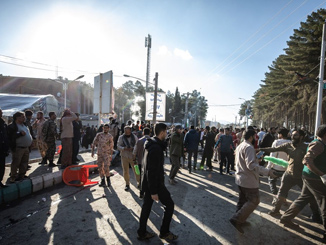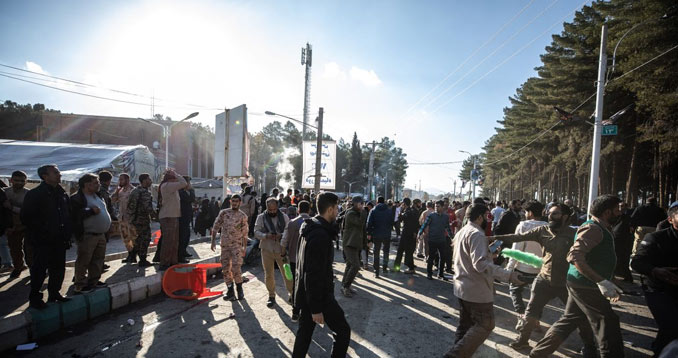

Two devastating explosions that occurred in the city of Kerman, Iran, inadvertently affect the Taliban; as it is claimed that the Khorasan branch of ISIS, which operates under the Taliban’s control in Afghanistan, is the perpetrator of the blasts. With the Taliban’s return to power once again, this incident marks the third occasion on which ISIS has executed a terrorist attack on Iranian soil – once in Kerman and twice at the Shah Cheragh Shrine in Shiraz. While the Taliban did respond to the Kerman explosions, Iranian government officials were dissatisfied with their reaction as they refrained from categorizing the attack as ‘terrorist.’ Nevertheless, numerous Iranian newspapers have enthusiastically highlighted the Taliban’s response, also emphasizing the purported animosity between this group and ISIS.
Hassan Kazemi Qomi, Iran’s ambassador to Kabul, met with Mullah Abdul Kabir, the deputy political leader of the Taliban, on Monday, 17th of Jadi. Contrary to expectations, this meeting was conventional and free of suspicion, much like previous encounters. During this meeting, ISIS was referred to as a ‘common enemy’ to destabilize the region. Meanwhile, it was acknowledged that the Taliban’s goal is to strengthen stability in the region.
The explosion of a passenger minibus in the Shia-populated Dasht-e Barchi area of Kabul, following the Kerman blasts, also appears to carry significance; as ISIS has claimed responsibility for both incidents. Similarly, the Islamic Republic, which perceives itself as the defender of Shia rights in the Islamic world, may not easily overlook the massacre by ISIS in Afghanistan. Assuming this is not the case, the looming presence of ISIS under the shadow of the Taliban emirate is also a cause of concern for Tehran.
The ISIS Khorasan attacks in Kerman, Iran, and western Kabul have raised the question of whether Iran’s stance towards the Taliban is being adjusted or not.
The answer to this question is negative, for the following reasons:
1. The Islamic Republic is suspicious about the involvement of ISIS-K in the Kerman explosion. However, secretly, it may have acquired information that has transformed doubt into certainty. At present, Iran is not particularly suspicious of ISIS due to its indirect conflicts with Israel and the U.S. in Gaza, Syria, Lebanon, Yemen, Iraq, the Red Sea, and other areas. If the current situation in the Middle East were not so tense, Iranian officials might have focused on ISIS. Moreover, the expressed views of U.S. officials regarding the Kerman explosions have somewhat reduced Tehran’s suspicions towards ISIS. After the explosions, Matthew Miller, the spokesperson for the U.S. State Department, stated that neither Washington nor Tel Aviv had any involvement in the Kerman incident, and it was the work of ISIS. Following this, Reuters reported, citing two U.S. sources, that the Kerman explosions were carried out by the Khorasan branch of ISIS; a claim that, if proven true, also inadvertently implicates the Taliban. Reuters, citing two U.S. sources, wrote that the information about ISIS carrying out the attack is ‘explicit and undeniable.’
The Islamic Republic, which views America as its enemy, is cautious when accepting intelligence from its intelligence agencies regarding an attack that claimed the lives of over a hundred Iranians. Tehran suspects that Washington, to clear its own and Israel’s role, maybe disseminating false information. Therefore, when Iran hesitates to attribute the Kerman explosions to ISIS, it is evident that it continues to stand alongside the Taliban.
2. Apart from the aforementioned matter, the Islamic Republic, for other reasons, evaluates the information from U.S. officials as deceptive and believes it is an attempt to engage Tehran with Kabul. Israel is embroiled in the Gaza conflict, as is the U.S. Preventing the escalation of this war appears to have become a responsibility for Washington. Hashd al-Shaabi, Kata’ib Hezbollah, and the Houthis, who are alleged to be supported by the Islamic Republic, engage in provocative operations against the U.S. in the region; actions that have elicited responses from the country. Iranian officials suspect that Washington seeks to divert Iran’s attention from the Gaza war, and attributing the Kerman explosions to ISIS is the simplest way to do so. This is because by creating a new responsibility for that country, its relationship with the Taliban might also come under scrutiny.
The Islamic Republic deeply distrusts the United States; it believes that the U.S. seeks to entrap its adversaries wherever possible. For instance, the Tasnim News Agency, reportedly affiliated with the Iranian government, has questioned the credibility of ISIS statements, attributing them to Israeli intelligence agencies. Similarly, it’s claimed that Russia has been lured into the Ukraine conflict due to U.S. instigation. China might also find itself ensnared in the Taiwan issue. Iran suspects that the U.S. aims to turn Afghanistan, under the Taliban’s control, into another Ukraine. Therefore, Iran exercises extreme caution before reacting to leaked information from U.S. sources. If Tehran were to accept that ISIS was behind the Kerman bombings, it would still attribute the act to the U.S. and Israel, viewing ISIS as a creation of Washington. This is indeed an intriguing claim.
Why does the Islamic Republic want to say that, as the U.S. and Israel imply, ISIS carried out a terrorist attack in Kerman?
Perhaps Tehran, in an attempt to justify its hostility towards Washington and Tel Aviv, accuses these two countries of creating and supporting ISIS. Or, if it intends to seek revenge, it should target these two countries, not ISIS, which does not have a clear address.
3. The Islamic Republic still adheres to the slogan that apparently, the Taliban are enemies of ISIS. For example, some time ago, Hossein Amir Abdollahian, Iran’s Foreign Minister, stated that the Taliban are not ISIS; rather, they fight against this group. In the meeting between Mullah Kabir and Kazemi Qomi, ISIS was also mentioned as a common enemy. The Iranian embassy in Kabul also reported that Qomi assured the Taliban that Iran does not support war in Afghanistan: ‘Iran will not support any group that threatens Afghanistan’s territorial integrity.’ However, simultaneously, Qalibaf, the Speaker of the Iranian Parliament, in a meeting with Rustam Emomali, the Speaker of the Tajikistan Parliament, attributed the Kerman bombings to the activities of ISIS in Afghanistan; statements that seemingly differ from Qomi’s optimistic remarks.
If the Islamic Republic were to discover that the Kerman bombings were the work of ISIS Khorasan, it would not revert to supporting the Taliban; because it has grown excessively fond of the enmity between these groups. Iran’s effort is to contain the threat of ISIS with the help of the Taliban, not to create a new enemy for itself unless the ISIS threat persists, leading to conclusions that highlight the recklessness of Kabul’s current leadership.
The Taliban have also responded to statements from U.S. sources. The “Al-Morasad” media outlet, reportedly affiliated with the Taliban, rejected U.S. claims about the presence of ISIS Khorasan in Afghanistan, stating that the group is present in regional countries: “Western intelligence agencies spread such rumors and misinformation to conceal the true location of ISIS Khorasan.” This Taliban-affiliated outlet further wrote: “The recent attacks in Kerman are designed by major anti-Iran intelligence agencies and some domestic networks.” Interestingly, the media outlet affiliated with the Taliban appears to support ISIS’s denial of the Kerman attack, contrary to expectations. This is because the Taliban inadvertently became involved, and their consistent slogan of complete suppression of ISIS is like their slogans in other fields, blown away by the wind.
In summary, while the relationship between the Islamic Republic and the Taliban may change in other areas (such as establishing an all-inclusive government, rights, refugees, etc.), regarding what is perceived as the fight against ISIS, it will not change anytime soon. The belief persists that the relationship between the Taliban and ISIS is one of enmity, nothing more.
